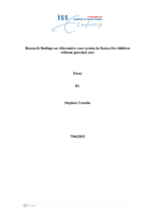Introduction
This paper examines alternative care in Kenya. The focus will be on the genesis of alternative care; the non- prosaic multiple factors contributing to the situation, situational analysis on data, and child protection frameworks. What is more, it will highlight service providers, the role of the Government, last but not least deconstruct the practical realities of the eclectic forms of alternative care, and the legal sociocultural, and economic contestations within each care model.
Alternative care is ‘a formal or informal arrangement whereby a child is looked after at least overnight outside the parental home, either by decision of a judicial or administrative authority or duly accredited body, or at the initiative of the child, his/ her parent (s) or primary caregivers, or spontaneously by a care provider in the absence of parents’ (Better Care Network Toolkit 2014). A child in Kenya refers to ‘any human being under the age of eighteen years’ (Children’s Act: 2001: Par 2). There is presumed deductive dichotomy of childhood as an age of dependence, vulnerability and adulthood (above 18) as an age of ‘independence’ (Gough et al 2013: 3). Children not under supervised care of an adult are assumed to be in a precarious situation and in need of alternative care.

